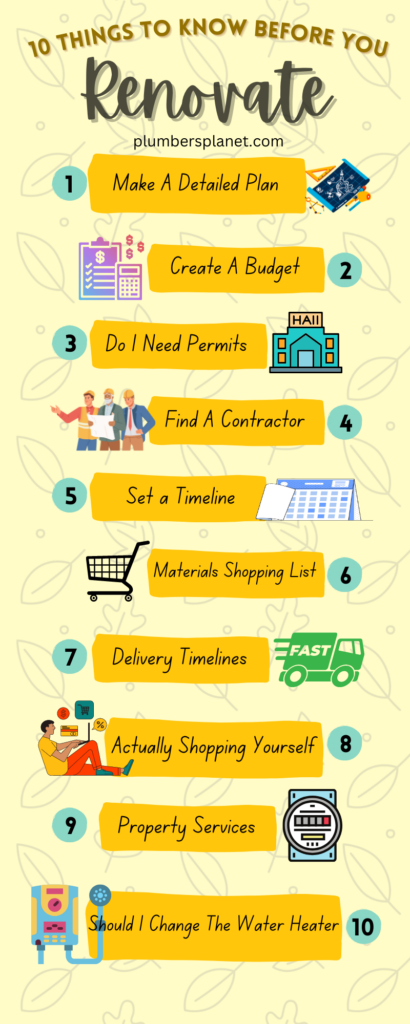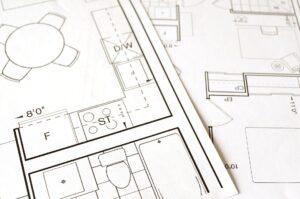
- Make a detailed plan
- Make a plan for the money
- Pay attention to what the local authority says
- Locate a contractor
- Know when you start and when you finish.
- Choosing what to buy
- The purchasing of building materials
- What materials should I buy on my own?
- What kinds of services can I get for my property?
- How do I know what kind of hot water heater will suit my needs?
Read in detail, the ten most important things you should think about before you start any kind of renovation. Before you start renovating your home, you can save a lot of time and money by planning and making decisions carefully.
There are a number of heartbreaking stories about home renovations that don’t turn out as planned. They often go way over budget or schedule, or unexpected problems come up and totally destroy months or even years of work.
Most of these problems could have been avoided if careful planning and decisions had been made earlier in the renovation process. Here are ten things you need to seriously think about before you start to fix up your house.
10 Things To Consider BEFORE Starting Renovation Work
 Make a Detailed Plan
Make a Detailed Plan
You should create plans for your bathroom or kitchen. Talk to your contractor about the plans. Tell him what kinds of items you want, so he knows what needs to be done. For example, if you choose a pot-filler by the stove, the contractor will need to know so he can organize the plumbing properly before the kitchen backsplash is done. It’s best to have the specs for all of the merchandise you’ve chosen so that the contractor clearly understands what needs to be done.
Make A Plan For The Money
Before you start your search for a new kitchen or bathroom, you need to know how much you can spend. Whether you are borrowing money or paying for the project out of your own pocket, you need to figure out how much it will cost. Some contractors also offer ways for customers who qualify, to get loans.
Pay Attention To What The Local Municipality Says
If your home is on the list of historic places (historical designation…some areas refer to this as a Heritage Home), you will have to follow strict rules set by the governing authority. Before work can start on a lot of renovations, city hall has to give its approval. Talk to your local city hall to find out more.
Depending on the depth of the renovation this usually involves blueprints or drawings (not necessarily done by an architect or engineer, if you have some skills), site inspections by the municipality, permits (these usually cost money), more inspections, the local electrical authority inspections (if you’re doing electrical work), and if you’re moving load-bearing walls, and engineer does need to be involved.
 Locate A Contractor
Locate A Contractor
Talk to family and friends who have built a home or made changes to one. You should look for a contractor that you can talk to. Make sure you hear and understand everything they say. Book a contractor far in advance, because they can be booked up to a few months in advance.
Check the contractor’s credentials before hiring them. Find out as much as you can about someone before you hire them. One good way to check someone out it to see if they have a Google My Business profile. You can learn a lot about a business by checking this resource. Also, keep in mind that usually, your product warranties only apply if a licensed contractor installs them.
Know When You Start and When You Finish
Talk to your contractor and come to an understanding on when the project can start and when it will be done. Tell your contractor if the job needs to be done by a certain date. For example, if you have people coming to stay, they should know. No matter how meticulous your planning is, remember that unforeseen obstacles can delay your project.
Choosing What to Buy
It may take multiple trips to the store before you find the perfect combination of items that will give you the appearance you want while also meeting your functional requirements. You can look through a catalogue in print or online. Once you choose a style (modern, heritage, or easy living), you can choose from fewer products. Know if there are any size limits on the room. Print or write down the product specifications and take measurements of your bathroom.
Talk with your contractor about the options you have. If the contractor says that the product you chose doesn’t work, find out why. It could be that they have to do more work than they want to. Don’t forget that it’s your home and that you need to be happy with the work when it’s done.
 Purchasing of Building Materials & Delivery Timelines
Purchasing of Building Materials & Delivery Timelines
Find out how long delivery will take before you buy something. Some items, like faucets and toilets, will be in stock, while others, like spas and vanity units, will be made to order and can take up to a month to get (There are options to buy off the shelf now, which may work out well for you, if you’re not too fussy).
Often, these custom-made items can’t be returned, so make sure your contractor knows what you want before you order. Find out from your contractor what they need first. Usually, the shower base, bath or spa, and mixers, if they are going on the wall, are the first things you need.
As The Building Owner, What Should I Buy On My Own?
If you are building your own home, make sure you buy the main items for your bathroom, kitchen, and laundry room. This will make sure you make all the right choices and get what you want. There will be things you don’t think about when placing an order, like the different types of handles on a vanity unit or where your spa’s pump goes. It’s important to make these choices on your own because they will affect how your project turns out as a whole. Your plumber can buy smaller fittings for you if you need them.
What Kinds of Services Can I Get For My Property?
You should know if you need gas or electric appliances (hot water unit, cooking appliances). If you live further out from the city, you may need LPG appliances. Inquire with your contractor as to whether or not switching from electric to gas appliances will save you money in the long run if you now use electric. The plumbing in a new home must be roughed in before construction can begin, so it’s important to choose your appliances ahead of time.
 How Do I Know What Kind of Hot Water Heater Will Suit My Needs?
How Do I Know What Kind of Hot Water Heater Will Suit My Needs?
Obviously, this one’s optional. You may not need a new water heater. Having said that, there’s new technology that makes heating water very efficient now. There are a lot of different kinds of hot water heaters, and it can be hard to choose one.
If you are replacing an old unit, you may not have as many options, so talk to a technician.
At the moment, tankless, or on-demand hot water heaters are popular, but they need a bigger gas line than regular water heaters. This can mean big changes to the plumbing/gas, which can be very expensive, but in the long run, the instant hot water systems can be cheaper.
Although, they do need more regular maintenance than the old style tank water heater.
10 Things You Need to Know Before You Build or Remodel – Conclusion
Many of these considerations may appear obvious; nonetheless, the trouble occurs when they are taken for granted. If you don’t make sure that everything is taken care of, you may end up spending a lot of time, effort, and money on a home renovation that you don’t like. So, treat these 10 reno tips with the seriousness that they deserve. As someone said “If you fail to plan, then you plan to fail!”.
#kitchenrenovation #homerenovation #bathroomrenovation #plumbingsupplies
